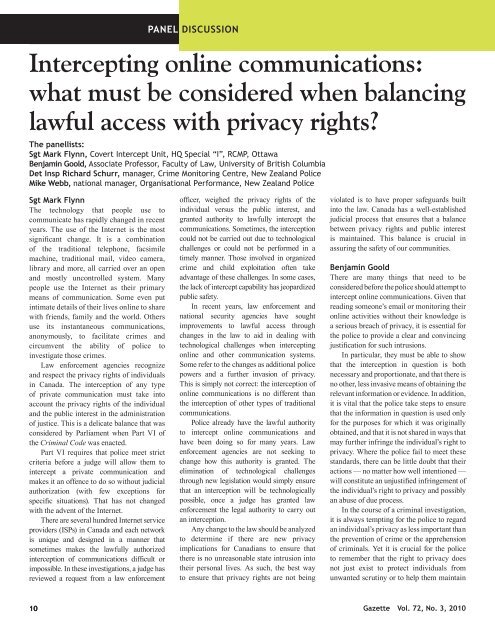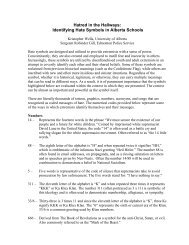RCMP Gazette Human Rights and Policing - Alberta Hate Crimes ...
RCMP Gazette Human Rights and Policing - Alberta Hate Crimes ...
RCMP Gazette Human Rights and Policing - Alberta Hate Crimes ...
You also want an ePaper? Increase the reach of your titles
YUMPU automatically turns print PDFs into web optimized ePapers that Google loves.
PANEl DiSCuSSiONIntercepting online communications:what must be considered when balancinglawful access with privacy rights?The panellists:Sgt Mark Flynn, Covert Intercept Unit, HQ Special “I”, <strong>RCMP</strong>, Ottawabenjamin Goold, Associate Professor, Faculty of Law, University of British ColumbiaDet insp Richard Schurr, manager, Crime Monitoring Centre, New Zeal<strong>and</strong> PoliceMike Webb, national manager, Organisational Performance, New Zeal<strong>and</strong> PoliceSgt Mark FlynnThe technology that people use tocommunicate has rapidly changed in recentyears. The use of the Internet is the mostsignificant change. It is a combinationof the traditional telephone, facsimilemachine, traditional mail, video camera,library <strong>and</strong> more, all carried over an open<strong>and</strong> mostly uncontrolled system. Manypeople use the Internet as their primarymeans of communication. Some even putintimate details of their lives online to sharewith friends, family <strong>and</strong> the world. Othersuse its instantaneous communications,anonymously, to facilitate crimes <strong>and</strong>circumvent the ability of police toinvestigate those crimes.Law enforcement agencies recognize<strong>and</strong> respect the privacy rights of individualsin Canada. The interception of any typeof private communication must take intoaccount the privacy rights of the individual<strong>and</strong> the public interest in the administrationof justice. This is a delicate balance that wasconsidered by Parliament when Part VI ofthe Criminal Code was enacted.Part VI requires that police meet strictcriteria before a judge will allow them tointercept a private communication <strong>and</strong>makes it an offence to do so without judicialauthorization (with few exceptions forspecific situations). That has not changedwith the advent of the Internet.There are several hundred Internet serviceproviders (ISPs) in Canada <strong>and</strong> each networkis unique <strong>and</strong> designed in a manner thatsometimes makes the lawfully authorizedinterception of communications difficult orimpossible. In these investigations, a judge hasreviewed a request from a law enforcementofficer, weighed the privacy rights of theindividual versus the public interest, <strong>and</strong>granted authority to lawfully intercept thecommunications. Sometimes, the interceptioncould not be carried out due to technologicalchallenges or could not be performed in atimely manner. Those involved in organizedcrime <strong>and</strong> child exploitation often takeadvantage of these challenges. In some cases,the lack of intercept capability has jeopardizedpublic safety.In recent years, law enforcement <strong>and</strong>national security agencies have soughtimprovements to lawful access throughchanges in the law to aid in dealing withtechnological challenges when interceptingonline <strong>and</strong> other communication systems.Some refer to the changes as additional policepowers <strong>and</strong> a further invasion of privacy.This is simply not correct: the interception ofonline communications is no different thanthe interception of other types of traditionalcommunications.Police already have the lawful authorityto intercept online communications <strong>and</strong>have been doing so for many years. Lawenforcement agencies are not seeking tochange how this authority is granted. Theelimination of technological challengesthrough new legislation would simply ensurethat an interception will be technologicallypossible, once a judge has granted lawenforcement the legal authority to carry outan interception.Any change to the law should be analyzedto determine if there are new privacyimplications for Canadians to ensure thatthere is no unreasonable state intrusion intotheir personal lives. As such, the best wayto ensure that privacy rights are not beingviolated is to have proper safeguards builtinto the law. Canada has a well-establishedjudicial process that ensures that a balancebetween privacy rights <strong>and</strong> public interestis maintained. This balance is crucial inassuring the safety of our communities.benjamin GooldThere are many things that need to beconsidered before the police should attempt tointercept online communications. Given thatreading someone’s email or monitoring theironline activities without their knowledge isa serious breach of privacy, it is essential forthe police to provide a clear <strong>and</strong> convincingjustification for such intrusions.In particular, they must be able to showthat the interception in question is bothnecessary <strong>and</strong> proportionate, <strong>and</strong> that there isno other, less invasive means of obtaining therelevant information or evidence. In addition,it is vital that the police take steps to ensurethat the information in question is used onlyfor the purposes for which it was originallyobtained, <strong>and</strong> that it is not shared in ways thatmay further infringe the individual’s right toprivacy. Where the police fail to meet thesest<strong>and</strong>ards, there can be little doubt that theiractions — no matter how well intentioned —will constitute an unjustified infringement ofthe individual’s right to privacy <strong>and</strong> possiblyan abuse of due process.In the course of a criminal investigation,it is always tempting for the police to regardan individual’s privacy as less important thanthe prevention of crime or the apprehensionof criminals. Yet it is crucial for the policeto remember that the right to privacy doesnot just exist to protect individuals fromunwanted scrutiny or to help them maintain10<strong>Gazette</strong> Vol. 72, No. 3, 2010







